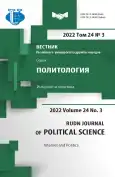Жизнь в условиях COVID-19: новые возможности для обычной общественно-политической жизни в необычной ситуации
- Авторы: Пастармаджиева Д.Д.1, Ангелова М.Н.1
-
Учреждения:
- Пловдивский университет Паисия Хилендарского
- Выпуск: Том 24, № 3 (2022): Интернет и политика
- Страницы: 562-572
- Раздел: ПОЛИТИЧЕСКАЯ ПОЛЯРИЗАЦИЯ И ИНТЕРНЕТ-ПРОТЕСТ
- URL: https://journal-vniispk.ru/2313-1438/article/view/322619
- DOI: https://doi.org/10.22363/2313-1438-2022-24-3-562-572
- ID: 322619
Цитировать
Полный текст
Аннотация
Пандемия COVID-19 поставила под удар многие национальные и международные системы и отношения и продемонстрировала, насколько уязвимы общества. Правительства были вынуждены принять ограничительные меры в целях защиты общественного здравоохранения. Наиболее сложным аспектом было достижение баланса между охраной общественного здравоохранения и функционированием экономики. Поскольку этой цели было достичь нелегко, некоторые правительства столкнулись с проблемами в коммуникации с обществом вплоть до протестов. В условиях совершенно нового вызова протесты усложнили задачу правительств и грозили нанести ущерб хрупкой политической стабильности. Цель настоящего исследования заключается в выявлении проблем, связанных с коммуникацией между обществом и правительством, и определении возможного решения для обеспечения диалога в таких ситуациях. Объектом исследования являются граждане государств - членов ЕС, и в центре внимания находится их отношение к правительственным мерам, связанным с пандемией в 2020 и 2021 гг. Наши материалы и методы включают обзор научной литературы, посвященной этим темам. Параллельно мы провели вторичную обработку количественных данных Евробарометра с использованием IBM SPSS v. 26. Результаты показывают, что меры, ограничивающие гражданские свободы, приводят к социальной напряженности, даже если правительства адаптируют свой подход и ищут новые возможности. Это приводит к выводу, что для обеспечения нормального функционирования социальных систем правительствам следует найти способ вовлечения заинтересованных сторон в процесс принятия решений. Последнее возможно с помощью цифровых инструментов и разработки системы, которая будет внедряться во время кризисов, даже если этот кризис не вызван пандемиями.
Ключевые слова
Об авторах
Даниела Добрева Пастармаджиева
Пловдивский университет Паисия Хилендарского
Email: daniela.pastarmadzhieva@uni-plovdiv.bg
ORCID iD: 0000-0002-5857-3595
кандидат политических наук, доцент кафедры политических наук и национальной безопасности
Пловдив, БолгарияМина Николаева Ангелова
Пловдивский университет Паисия Хилендарского
Автор, ответственный за переписку.
Email: mina.angelova@uni-plovdiv.bg
ORCID iD: 0000-0002-1094-6356
кандидат экономических наук, доцент кафедры менеджмента и количественных методов в экономике
Пловдив, БолгарияСписок литературы
- Burns, L. (2020). 4 potential political risks arising from COVID-19. Retrieved June 7, 2022, from https://www.wtwco.com/en-US/Insights/2020/04/four-potential-political-risks-arising-from-covid-19
- De Simone, E., & Mourao, P.R. (2021). What determines governments’ response time to COVID-19? A cross-country inquiry on the measure restricting internal movements. Open Economics, 4(1), 106-117. http://doi.org/10.1515/openec-2020-0116
- Eckstein, H. (1966). Division and Cohesion in Democracy: A Study of Norway. Princeton: Princeton University Press.
- Flood, C.M., MacDonnell, V., Thomas, B., & Wilson, K. (2020). Reconciling civil liberties and public health in the response to COVID-19. FACETS, 5(1), 887-898. http://doi.org/10.1139/facets-2020-0070
- Hammad, M., Bacil, F., & Soares, F.V. (2021). Next Practices-Innovations in the COVID-19 social protection responses and beyond. (Research Report No. 60 Research Report No. 60). United Nations Development Programme and International Policy Centre for Inclusive Growth.
- Herbert, S., & Marquette, H. (2021). COVID-19, Governance, and Conflict: Emerging Impacts and Future Evidence Needs. Institute of Development Studies (IDS). http://doi.org/10.19088/K4D.2021.029
- Hurwitz, L. (1973). Contemporary Approaches to Political Stability. Comparative politics, 5, 449.
- Mandel, A., & Veetil, V. (2020). The economic cost of covid lockdowns: An out-of-equilibrium analysis. Economics of Disasters and Climate Change, 4(3), 431-451. http://doi.org/ 10.1007/s41885-020-00066-z
- Pastarmadzhieva, D.D., Angelova, M.N., Raychev, S.A., Madzhurova, B.P., & Desev, K.V. (2022). Ensuring sustainability during a crisis using an innovative flexible methodology. Sustainability, 14(5), 2996. http://doi.org/0.3390/su14052996
- Pereirinha, J.A. C., & Pereira, E. (2021). Social resilience and welfare systems under COVID-19: A European comparative perspective. Global Social Policy, 21(3), 569-594. http://doi.org/10.1177/14680181211012946
- Perry, J. (2021). The politics of economic insecurity in the COVID-19 era (Policy Brief #91). United Nations Department of Economic and Social Affairs. Retrieved June 7, 2022, from https://www.un.org/development/desa/dspd/wp-content/uploads/sites/22/2021/02/PB_91-1.pdf
- Pronk, N.P., & Kassler, W.J. (2020). Balancing health and economic factors when reopening business in the age of COVID-19. Journal of Occupational & Environmental Medicine, 62(9), e540-e541. http://doi.org/10.1097/JOM.0000000000001955
- Seghieri, C., La Regina, M., Tanzini, M., & Tartaglia, R. (2021). Looking for the right balance between human and economic costs during COVID-19 outbreak. International Journal for Quality in Health Care, 33(1), mzaa155. http://doi.org/10.1093/intqhc/mzaa155
- van der Zwet, K., Barros, A.I., van Engers, T.M., & Sloot, P.M. A. (2022). Emergence of protests during the COVID-19 pandemic: Quantitative models to explore the contributions of societal conditions. Humanities and Social Sciences Communications, 9(1), 68. http://doi.org/10.1057/s41599-022-01082-y
- Vilisov, M., Telin, K., & Filimonov, K. (2021). Possible assessment of the stability and sustainability of modern state systems. Russian Foundation for Basic Research Journal. Humanities and Social Sciences, 76-83. http://doi.org/10.22204/2587-8956-2020-10205-76-83 (In Russian).
- Woods, E.T., Schertzer, R., Greenfeld, L., Hughes, C., & Miller-Idriss, C. (2020). COVID-19, nationalism, and the politics of crisis: A scholarly exchange. Nations and Nationalism, 26(4), 807-825. http://doi.org/10.1111/nana.12644
- Volodenkov, S.V., & Fedorchenko, S.N. (2022). Traditional political institutions in the context of digitalization: Risks and prospects of transformation. Discourse-P, 19(1), 84-103. https://doi.org/10.17506/18179568_2022_19_1_84 (In Russian).
Дополнительные файлы









